Good morning!
Greetings in the name of Father, Son, and Holy Spirit.
Praying for you, your family, your community, and the rest of the world. Right now, the whole world is suffering because of the Coronavirus (COVID-19). Let’s pray together to God, Our Ever-Loving Father, His mercy and protection on all, and God’s healing on those who are infected by the Coronavirus. We all believe God’s grace and love rest on all who look upon Him every moment with faith in Him.
No longer shall your name be called Abram, but your name shall be Abraham, for I have made you the father of a multitude of nations. (Genesis 17:5)

To get Abraham, the new name, Abram walked with God throughout the ups and the downs and through the valleys and the mountain tops. Nothing was what he initially expected. He had a childlike faith, and he immediately followed God upon hearing God’s calling with the promise that nobody had ever heard before Abram. Bravely he took his wife, Sarah, and his nephew, Lot., and left his native land and relatives. Nobody dared to go with Abraham because nobody wanted to take the enormous risk that Abraham about to take with his family and his nephew.
Abraham’s faith is exemplary. Abraham obediently followed God. God loved Abraham, and Abraham, in turn, loved God. He replicated God’s love to his family and nephew. Sometimes his love cost him, which could not deter him. After all, there is no love without sacrifice.
Love does no wrong to a neighbor; therefore love is the fulfilling of the law. (Romans 13:10)
Neighbors are near or with us, not far away nor related at all. Thus, there are constant interactions with neighbors. By the way, loving those near us is much more complicated than those far away. Those who are near often getting in under our skin. Yes, nobody said it is simple and easy to love neighbors. It is the reason why the Bible says “love neighbors.”
Jesus replied, “The most important commandment is this: ‘Listen, O Israel! The Lord our God is the one and only Lord. And you must love the Lord your God with all your heart, all your soul, all your mind, and all your strength.’ The second is equally important: ‘Love your neighbor as yourself.’ No other commandment is greater than these.” (Mark 12:29-31)
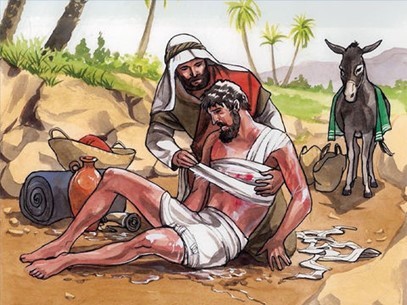
Abraham loved his nephew as if his child. However, as Abraham and Lot’s wealth increased, conflicts came. It was not the case when they had little wealth. One day, a big dispute broke out between the herdsmen of Abraham and Lot. It was so big that it fractured the relationship between Abraham and Lot. That night, Abraham could not sleep well and pray to God for God’s wisdom and guidance. Then Abraham got up early the following morning and came to Lot. Abraham said to Lot,
“Let’s not allow this conflict to come between us or our herdsmen. After all, we are close relatives! The whole countryside is open to you. Take your choice of any section of the land you want, and we will separate. If you want the land to the left, then I’ll take the land on the right. If you prefer the land on the right, then I’ll go to the left.” (Genesis 13:8b-9)
Abraham lovingly gave all that Lot wanted. Indeed, what Lot had practically belonged to Abraham. Even so, Abraham gave all that Lot regarded as he owned. Then Abraham let Lot choose the land before them. Although Abraham had all the right to make a selection for himself first, he didn’t. He so loved his nephew, Lot, and Abraham gave the best by offering a right to choose the land before both Abraham and Lot.
When the big dispute broke out, Abraham could have blamed Lot while asking why Lot did not take care of Lot’s herdsmen so that there was enough space between Lot’s herdsmen and Abraham’s herdsmen to avoid such a big dispute. And then, Abraham could have demanded a plan to path forward, not to repeat another big conflict in the future. But Abraham didn’t. Instead, Abraham loved Lot and gave the best. Abraham’s love was bigger than the troublesome Lot’s herdsmen and Lot’s greed.
Then Lot took a long look at the fertile plains of the Jordan Valley in the direction of Zoar. The whole area was well watered everywhere, like God’s garden or the beautiful land of Egypt. (This was before God destroyed Sodom and Gomorrah.) Lot chose for himself the whole Jordan Valley to the east of them. He went there with his flocks and servants and parted company with his uncle Abraham.
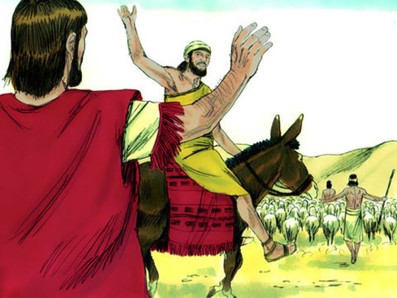
Lot was leaving Abraham, and Abraham could not take off his eyes on Lot getting smaller and smaller as Lot was leaving away from him. God also gracefully watched what was happening — what Abraham had been doing to Lot, and what Lot was doing.
Lot moved his tents to a place near Sodom and settled among the cities of the plain. But the people of this area were extremely wicked and constantly sinned against God.
Abraham settled in the land of Canaan. Abraham believed God and relied on Him rather than the fertile land, which was favorable to his sheep and herdsmen. What he got was not so good as what Lot had. However, Abraham contented because Abraham gave the best to Lot in his love. Yes, Abraham’s love cost a lot in this world, and God saw it.
After Lot had gone, God said to Abram,
“Look as far as you can see in every direction—north and south, east and west. I am giving all this land, as far as you can see, to you and your descendants as a permanent possession. And I will give you so many descendants that, like the dust of the earth, they cannot be counted! Go and walk through the land in every direction, for I am giving it to you.” (Genesis 13:14-17)
God patiently saw what Abraham did out of his love to Lot, and God came to Abraham. God comforted him and reinstated His promise with Abraham. Abraham gave up the earthly matters for Lot, and God blessed Abraham. It is the secret for those who walk with God and live out God’s love to neighbors.
So Abraham moved his camp to Hebron and settled near the oak grove belonging to Mamre. There he built another altar to God as always. Abraham was truly faithful to God.
Indeed, the word “neighbor” comes from two words: “nearness” and “inhabitant,” and “Nearness” is the key. Nearness is not limited to physical proximity but also the degree of our emotional or spiritual bonding. In this sense, loving God is the same as loving neighbors living near us because God, although He is invisible, is the closest spiritually bounded neighbor. God also loves us as the closest neighbors. To Him, we are the most precious creation, and He pours out His unfathomable love like His own sons or daughters. This loving relationship also brings us heartbreak.
Many of us have already experienced how heartbreaking when we see our loved one loves another person than us. God has the same heartbreak that we feel when we love someone or something other than God. It is not difficult to know that God’s heart is bigger than anyone’s heart on earth. Then how big the heartbreak of God would be when we love others than God?
It is the reason why God dedicated the first four of the Ten Commandments to explain how sad His heart would be if we love something other than God by worshiping them. Even so, many people broke His Heart again and again. God sent the great flood and saved only one Noah’s family, who were faithful to God, but their descendants did not hold up to Noah’s faithfulness. Nevertheless, God picked Abraham in His goodwill and promised to bless Abraham’s descendants with His immeasurable blessings. Still, Abraham’s descendants did not measure up God’s promise without reciprocating God’s love. All fixated on and loved the earthly things while forgetting how much God loved them by calling out with God’s solemn promise. Sadly, Abraham’s descents, God’s chosen people, ended up as the Bible records:
all the people did whatever seemed right in their own eyes. (Judges 21:25b)
The above verse should sound very familiar. The above particular verse was written about 550 BCE, which is about 2,500 years ago. However, the world where we are living now is not much different from that of 2,500 years ago. People chase and love whatever is looking good in their own eyes. God is no longer the center of the love in hearts. Can we imagine how much this generation breaks the immeasurably big heart of God?
Jesus did many other things as well. If every one of them were written down, I suppose that even the whole world would not have room for the books that would be written. (John 21:25)
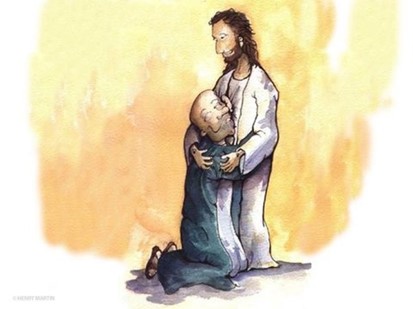
John concluded the Book of John with the above verse. John is known as the apostle of love because Jesus most loved John. Most importantly, he wrote most about Jesus’ love. The Book of John describes the immeasurably big heart of Jesus Christ and how He loved His disciples and those who would believe in Him. It is not surprising that the Book of John contains the word “love” among the New Testament most. The above verse perfectly reflects how big Jesus’ love is. The entire world would not be enough just to write down Jesus Christ’s love, let alone contain His love.
Even so, reciprocating God’s love is complicated because God is invisible. Unless we experience God’s love and truly internalize His love manifested on the cross, where God sacrificed His Only Begotten Son, Jesus Christ, to love God is practically impossible. The Roman Centurion watching Jesus Christ dying on the cross later confessed his heart.
The centurion, seeing what had happened, praised God and said, “Surely this was a righteous man.” (Luke 23:47)
The centurion witnessed how people died on the cross, bitterly, resentfully, and cursing at others. Jesus Christ on the cross was different. Jesus Christ loved all till the end, and Jesus touched the centurion’s heart. The centurion, the commander of 100 Roman soldiers, executed countlessly many people on crosses, but he had never seen anyone like Jesus.
People near the cross insulted and mocked Him, but Jesus Christ continued showing compassion to those who mocked Him. Jesus Christ also gave forgiveness to those who tortured, nailed, and insulted Him in His love. Jesus also asked God’s forgiveness till His last breath on the cross. It was the love that moved the heart of the Roman Centurion.
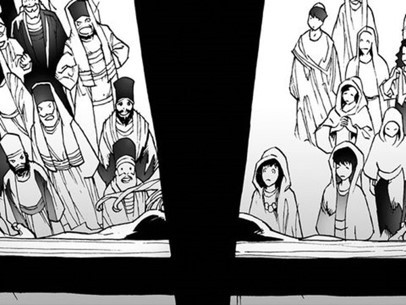
Who were the neighbors at the moment to Jesus? Those who were near Him, and doing all bad things that we can think of and even beyond. Some people mourned for Jesus, including His mother, other women, and some of His disciples at the scene. Jesus Christ was helplessly on the cross while dying with the excruciating pains and suffocating due to his body weight on the cross. Still, He never stopped breathing out His love to all, not just for those who mourned, but also for those who directly inflicted His physical pains and/or gorging out His pure heart with insults, mockeries, and temptations to nullify God’s eternal salvation plan.
“Look at you now!” they yelled at him. “You said you were going to destroy the Temple and rebuild it in three days. Well then, if you are the Son of God, save yourself and come down from the cross!” (Matthew 27:40)
Jesus Christ, who is God Himself, was more than capable of coming down from the cross. He even could summon 12 legions of angels who would protect Jesus Christ and utterly destroy all at the crucifixion scene and even the entire Roman army of the Roman empire.
That night the angel of the LORD went out to the Assyrian camp and killed 185,000 Assyrian soldiers. When the surviving Assyrians woke up the next morning, they found corpses everywhere. (2 Kings 19:35)
At that time, the Romain empire had 30 legions. One legion was about 5,000 soldiers. Thus, even a couple of angels could wipe out the entire Roman army.
If we had such power, and if we were on the cross and dying in extreme agony, and people near the cross gave a temptation of getting down from the cross, what would we do? The answer would be undoubtedly different from what Jesus Christ did. Jesus Christ loved “neighbors” at the crucifixion until the end, whether they were with Jesus while mourning for Jesus or against Jesus by physically piercing and hurling insults on Him. It is the love toward neighbors shown on the cross, which is far beyond what we can do.
Then it begs the question. How can we replicate the love of Jesus on the cross toward our neighbors? In other words, can we truly love our neighbors, who are in our ways, and even harming us emotionally, verbally, and even physically?
Sadly, as a human being, it is impossible.
But put on the Lord Jesus Christ, and make no provision for the flesh, to gratify its desires. (Romans 13:14)
This is the reason why we need to put on Jesus. By doing so, first, we can hide our ugly truth, and second and more importantly, it is the only way to get our eternal salvation. It is not because we are righteous, but because Jesus Chris is our savior, we are justified before God, and God grants our eternal salvations without our merits. When we meet God face to face, God does not look at our ugly internal truth but put His eyes on Jesus, who died on the cross to forgive our sins. Therefore, all our sins are completely forgiven at the cross. God does not look beyond the cross, which is our eternal assurance. We can confidently face God when we arrive at our Eternal Home.
We are still on earth. How should we do while in this world? Is it sufficient to keep hiding our ugly truth behind Jesus Christ? Absolutely not. We should be transformed by the power of the love of Jesus Christ. And we should not make any more provision for the flesh to graffiti its desires. Why? For example, an eye for an eye, and a tooth for a tooth are our flesh’s natural desire in us. And we tend to legitimize such a flesh desire in the name of justice. It is a deception manufactured by our flesh’s desire. How many tragedies in our lives start from such a deceptive flesh’s desire?
Then what can we do? We are the embodiment of the truth of God. We should persist in the truth of God daily in Him. Also, frequently look back at what Jesus did on the cross. He unjustly took the cross, but He gave his compassionate heart to those who insulted, mocked, physically hurt Him, as well as those who mourned for Him. Yes, Jesus Christ equally loved all till His breath on the cross. Although people tempted Jesus, He did not call 12 legions of angels to do earthly justice by repaying eye-to-eye and tooth-to-tooth. Jesus had never given in the worldly temptation but continued radiating God’s unfathomable love to the people near Him, i.e., the ”neighbors” at the cross. What Jesus did was so precious to God.
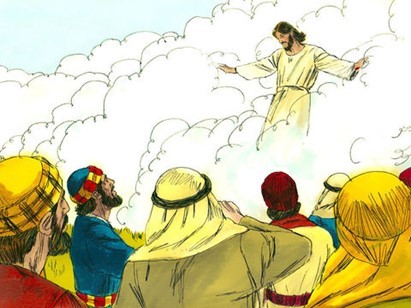
And being found in appearance as a man,
he humbled himself
by becoming obedient to death—
even death on a cross!
Therefore God exalted him to the highest place
and gave him the name that is above every name, (Philippians 2:8-9)
Abraham persisted in faith in God by loving his nephew, Lot till Lot’s departure. And Abraham continued blessing Lot, who took the best sheep and headed for the best land before Abraham. What Abraham did in love was precious to God. God came and encouraged Abraham and reassured the promise of God made with Abraham. Today, God is also eagerly searching for another Abraham. Can we be the ones for whom God eagerly searches?
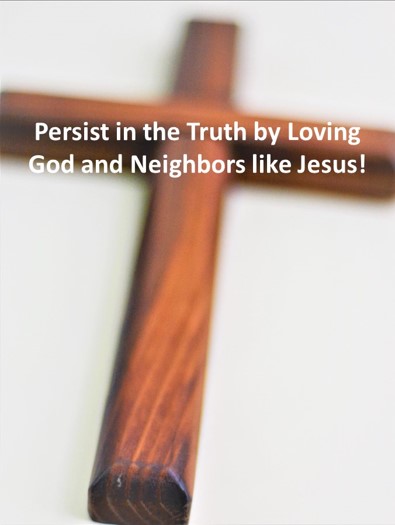
Most important of all, continue to show deep love for each other, for love covers a multitude of sins. (1 Peter 4:8)
